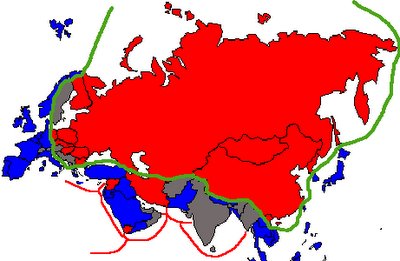
(Blue - Pro-U.S., Red - Pro-U.S.S.R, Gray - Neutral)
Any analysis of geography will show that Iran is one of the most important countries in the game to dominate the World Island (well Eurasia really since Africa isn’t too important). This can be seen in the prominent role Persia played in the British-Russian Great Game of the 19th Century to dominate Central Asia. However, Iran’s prominence to modern geopolitics began with Iran’s role in the Cold War strategy of containment. This map shows approximately how the world was arranged in 1948 (I took a few liberties such as Spain which wasn’t technically part of NATO but would be soon). There are only three locations where the Soviet Union was not hemmed in by blue countries. At the Adriatic Sea where they faced Western European and American forces, at the North Pacific where they faced American and soon Japanese forces, and at the Iranian border where all that stood between the Soviet Union and her age old dream of a warm water port was a weak neutral nation.
 (Blue - Pro-U.S., Red - Pro-U.S.S.R, Gray - Neutral, Green Line - Containment Line, Red Lines - Russia's ability to move outside of containment, Iran is hypothetically Red in this map)
(Blue - Pro-U.S., Red - Pro-U.S.S.R, Gray - Neutral, Green Line - Containment Line, Red Lines - Russia's ability to move outside of containment, Iran is hypothetically Red in this map)
As the next map shows, Iran’s importance only grew with the 1948 victory of the Communists in China, the pervasiveness of the communist guerrillas in Vietnam, and the defection of Yugoslavia from the Cominform. A victory by the Communists in Iran or Vietnam would have pushed the line of containment further from the U.S.S.R. and away from any choke points such as the Baltic Sea or Sea of Japan. This would not only make it easier for the Soviets to reach farther a field with their aid, military, and influence but would also have been a headache for the U.S. Navy (as the map crudely shows). They would have faced the World War I Royal Navy’s difficulties of chasing down far flung enemy cruiser detachments all over the world while also concentrating in the main theater. As can be seen, not only has the line of containment been precariously stretched, it would have been broken all together had Iran gone communist. I believe this to be a major factor determining how the U.S. dealt with Mossadeq and North Vietnam.
 (Blue - Pro-U.S., Red - Pro-Russia/China, Gray - Neutral, Purple - Contested)
(Blue - Pro-U.S., Red - Pro-Russia/China, Gray - Neutral, Purple - Contested)
This brings us to modern times. Iran is again at the center of the geopolitical jostling between the world’s two major blocs. Since the fall of the Soviet Union, Russia has been trying to rebuild something of her former empire and has been moving ever closer to China to try to achieve some level of influence in the world. While the Beijing-Moscow alliance is not a solid alliance based on common interests, it is based on a single major interest, confronting and diminishing the United States. Also, the U.S. alliance structure is not as secure as it was during the Cold war, but it is largely based on shared democratic and free market values. Other than the Ukraine and a few Asian countries that mostly ring China, the major countries that are being fought over (non-violently for now of course) are the 7 Stans, the three Transcaucasian nations, and Iraq.
Each is important in its own right. The states of Central Asia are not only the font of much Islamic extremism, but also sit on massive reserves of oil that the world desperately needs. China wants them in her orbit to secure access to non-Middle Eastern oil, to prevent terrorism from spreading to the Uighurs of Sinkiang, and to keep the U.S. out of her backyard. Russia wants to make sure that Central Asian oil flows through Russia thereby giving them control of its export, and also to keep the U.S. out of their backyard and former empire. The United States wants to fight terrorism, ensure oil supplies, and surround China. The Transcaucasus is important primarily as a point of ingress and egress for Central Asia that is not controlled by the Russians or the Chinese; something we would prefer to keep and something they obviously would like to stop. Pakistan is important to us as an entry point for Afghanistan and for the fight against terrorism. The Chinese would like Pakistan in their orbit so they can use Gwadar as a naval base to escape the U.S ring and as a threat to India (who is moving closer to the U.S. and Japan). Lastly there is Iraq. Iraq is important to the U.S. for the fight against terrorism, as a sign of credibility, and to hopefully be model someday for the rest of the Middle East that would move it more in favor of our interests. The Chinese and Russians would prefer we lose credibility in Iraq, and that it fall back in the hands of an anti-American dictator. From Iraq the rest of the Sunni Middle East, most notably Saudi Arabia, can be challenged.
From the map it can be seen that there is one country that borders these three key areas, Iran. Should Iran formally sign up with the Beijing-Moscow axis then it would be very difficult for the U.S. to maintain a hold on the Stans, Transcaucasia, and Iraq. Pakistan could not be expected to stay pro-U.S. as we become closer to India and a pro-Russia/China Iran is sitting to their rear. As a long country with little strategic depth, Pakistan cannot have enemies on both sides and since India will always be an enemy that would leave them little choice. The Transcaucasian countries (most importantly Azerbaijan) would have a hard time dealing with a concerted effort by alliance members on both sides, especially since their trade and energy supplies come from these countries. With Pakistan, Azerbaijan, and Iran lost, it would be impossible to hold onto the energy rich Central Asian Stans. Iraq would be more tenable but it would still be much more difficult to see it to a successful conclusion. With this, Beijing and Moscow would not only have most of Asia and most fo the world's oil production under their sway, but it would be virtually impossible for us to break into it. Combined with China’s inroads in Africa, and a little more effort with the weak Western Europeans, we could be entirely cut off of the World Island with the exception of India, which due to the Himalayas may as well be considered a maritime power anyways. The key to this power struggle, as with the last, is Iran. We cannot allow it to become a nuclear armed power that shares Russia and China’s anti-American world view and owes them for their protection. If we do we face the loss of everything we have gained since 1990 in the former Soviet Republics, Iraq, and the Stans.

No comments:
Post a Comment